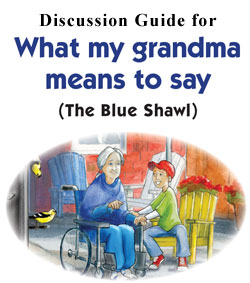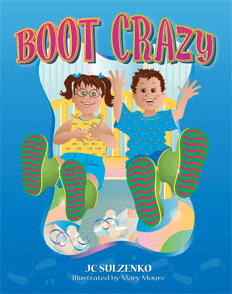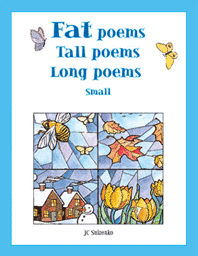(a play for elementary school students about Alzheimer’s disease)
“The Alzheimer Society of Thunder Bay (ASTB) had the amazing opportunity to partner with JC Sulzenko in early 2012 as we brought her play, What My Grandma Means To Say to life in the district of Thunder Bay. Two local actors and our Community Engagement Assistant staged the play in 11 elementary schools throughout the month of March 2012. It was a whirlwind tour! The one act play for children was very well received by the children and their teachers and provided an avenue for us to engage young people in a thoughtful and oftentimes moving discussion about the effects of dementia. We engaged our local Quilters Guild who diligently cut up 1,500 squares on which each child drew a memory, and the end result will be a small but meaningful quilt for each school depicting the memories that the children don’t want to forget. JC Sulzenko’s play has given us a new and focused opportunity to engage young people in this often frightening discussion about a disease that affects so many grandparents. We are very grateful for the support from JC and feel this is a very worthwhile project that can have a very big impact.” Alison L. Denton, Executive Director, Alzheimer Society of Thunder Bay
JC Sulzenko’s “What My Grandma Means To Say” has been a wonderful resource to the Alzheimer Society of Thunder Bay. When I first read the play, I was inspired to create the Arts and Alzheimer Education Project (AAEP); an interdisciplinary, arts-based, learning experience intended to generate discussion about Alzheimer’s disease, which featured a showing of the play. It was great to see how much the youth participants opened up in the discussion period following the play. Many of them bravely shared their stories about how they had been affected by Alzheimer’s disease personally and others asked poignant questions regarding the disease. The characters are written with such sincerity, which made it easy for the children to identify and relate to the play. Nicole Armstrong, Educator, Alzheimer Society of Thunder Bay
“In October, 2011, our Society partnered with Prince Edward Collegiate Institute to bring the play What my Grandma Means to Say to six elementary schools in Prince Edward County. The performances by four student actors under the guidance of Matt Sheahan, Head of Drama and Native Studies at PECI, were received with real enthusiasm and encouraged good discussion and learning about dementia. All in all, it was a remarkable experience, and, without hesitation, we would do it again!
As an off shoot of last fall’s presentations the Senior Drama Class at PECI were charged with creating an anthology around Alzheimer’s awareness. The result was a forty-five minute performance of monologues, poems and short skits that was delivered to other PECI classes. This created a new generation of ‘ambassadors’ in our community.” Linda Jackson, Executive Director, Alzheimer Society of Prince Edward Count
“This story is one that touches everyone, whether we have experienced Alzheimer’s or not. I have never had experience with Alzheimer’s, but I have experienced hope and the loss of hope. I have experienced the pain of losing someone I loved at a young age to a disease I didn’t understand. There are conversations we all need to have, regardless of our age, and I think this story highlights that beautifully.” Matthew T. Sheahan, Department Head of the Arts ad Native Studies, Price Edward Collegiate Institute, Picton, Ontario
“What my grandma means to say is an innovative and effective tool for teachers and parents to help children understand the special needs and capacities of people who suffer from dementia. In working with the Discussion Guide to accompany the play, drama is used to help open a dialogue about the issues. It is an excellent example of how arts-infused learning can help young people meet life’s challenges and develop a deeper understanding of their world.” Audrey Churgin, Executive Director, MASC, Ottawa
“You could tell that the play and the topic were relevant to Grades 4-6 by the interest shown by our students and the quality of their questions and comments. I would recommend this play to other teachers, classes and schools and would like a copy of the DVD, once produced.” Donna Beckkers-Boyd, Principal, Bayshore Catholic School, Ottawa
“The Alzheimer Society of Ottawa and Renfrew County (ASORC) is pleased to partner with JC Sulzenko on her project, What my grandma means to say (The Blue Shawl), a one-act play for children in whose families a person is living with some form of dementia. ASORC is incorporating this play into its youth education outreach programs for children in Grades 4,5 and 6 and their families whenever possible. ASORC is confident in the effectives of using this play to launch an informed discussion about the impact of Alzheimer’s disease and related dementias on individuals and the people who care for and about them. Having the play available on DVD will definitely widen its reach and impact.” Kathy Wright, Executive Director, Alzheimer Society of Ottawa and Renfrew County
“What My Grandma Means to Say is such a valuable educational tool. Although designed for children, the information provided is useful to all those who know someone with a dementia including family members, volunteers and professional staff.” Jen Dare, Program Facilitator, Dementia Program – Bronson Place, The Glebe Centre, Ottawa
“The delight of playing JC’s text lies in her use of vivid, tangible sense memory. She creates a progression for Granma where her focus is acute when the birds arrive; a lifetime of affectionate interplay is compressed into those three sentences. For me as actress, her cues are precise and so accurate that I found myself looping consciousness in rehearsal in the Alzheimer’s moments. … I realized that JC had written me a state which was exactly what was required: she is such a fine poet that her rhythm does in fact create the disconnect Granma exists in.” Eleanor Crowder, actor, founding Member, Salamander Theatre, Ottawa (Professional-level theatrical performances and drama-in-education workshops for children and youth)









What People Say / Testimonials
Share this: